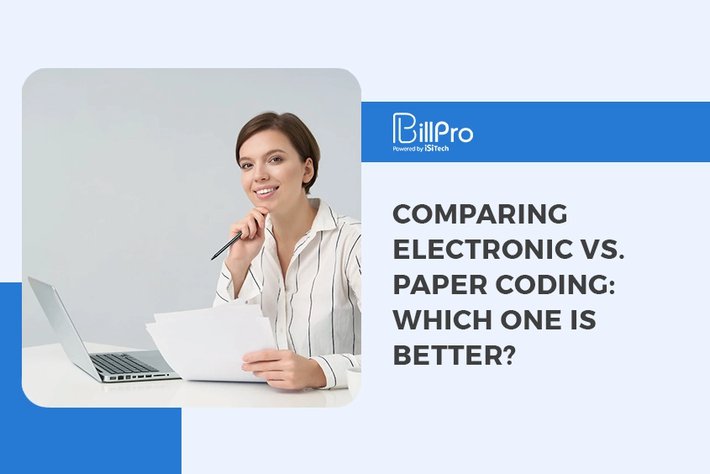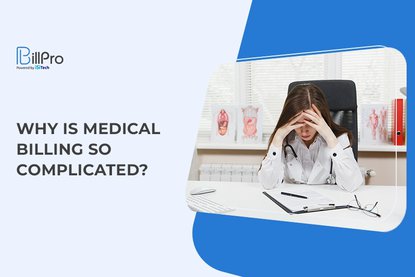The best healthcare service providers use the latest technology to provide seamless, efficient patient experiences. One of the best improvements is the transition to automated processes, especially billing.
Many healthcare facilities now offer a much smoother billing process using robust software. This ensures the proper submission of bills and quick follow-ups on claims.
But while electronic medical billing is more popular than ever, many hospitals and clinics still only provide traditional paper coding and billing. Why is this so? What are the advantages and disadvantages of each method?
This article breaks down all you need to know about electronic vs. paper coding and billing to understand what’s best for your client's needs.
What is Electronic Billing?

This involves the electronic submission and follow-up of all healthcare bills. They are often sent by email or through a billing platform. With one click, a provider can assess a patient's medical and payment history.
Advantages of Electronic Billing
Digital medical billing has many advantages:
-
Eliminates the need for physical storage and filing systems
-
Reduces the physical bulk of hard copies of medical records
-
Follows an automated process that records data and links it with a robust digital billing system
-
Limits redundancy
-
Sends information to healthcare providers and facilities in an instant
-
More cost-effective than paper coding
-
Minimal manual work - fewer staff members are needed to handle payments and other tasks
-
Third-party providers handle billing services at lower rates
-
Saves time for healthcare and medical providers
-
Digital information in electronic bills covers insurance, diagnosis, medical history, and transaction
Disadvantages of Electronic Billing
Electronic billing is not a perfect solution—it also has several disadvantages:
-
Providers and patients cannot ensure complete data security around the clock
-
The system can go offline for a while. Although cloud-bassed solutions guarantee 99.999% uptime
-
Not all patients and clients are proficient in technology. Some clients might prefer to receive and pay physical bills
-
Data breaches are common through malware, viruses, and hackers
-
Though data does not take up physical space, additional copies must be stored in physical hard drives to protect patient data.
What is Paper Billing?

Paper billing is when a physical copy of healthcare or medical bills is used. Using paper coding for billing could seem outdated, but there are still many areas in the country where workers and patients prefer paper coding and billing.
Advantages of Paper Billing
Despite being a largely outdated option, paper billing and coding still have a few advantages.
-
Provides tangible proof of payments and billing records
-
Makes record keeping easier for older staff that may not be proficient with technology
-
Patients use it as physical reminders of payments, credit, and all other vital transactions
-
For some, it is an easier way to keep records of all their healthcare transactions
Disadvantages of Paper Billing
Paper coding and billing has many disadvantages, especially in the digital age:
-
Physical documents can easily be lost or deteriorate
-
Paper coding is not environmentally-friendly and generates tons of waste
-
Healthcare providers and billers respond at slower rates when using paper coding
-
Processes for payments, claims, and submissions are also considerably slower compared to digital solutions
-
Less accurate as human error is more likely to occur
Electronic vs. Paper Coding: Does It Matter?
These days, using technology to improve medical services is a must. The speed and accuracy of billing providers such as NYBillPro benefit patients, hospitals, insurance companies, and all other parties involved. And accuracy and service speed are what matter to many.
Digital solutions also ensure that insurance companies can process claims more quickly. They significantly streamline the process for patients waiting for their benefits.
Additionally, more countries are becoming more aware of the waste produced in healthcare facilities. In a bid to make greener choices and be responsible for reducing waste, many companies are transitioning to electronic billing and doing away with most paper documents.
Many healthcare companies have turned to automation to reduce their carbon footprint and save on space when it comes to files and medical records. Hospitals no longer have to keep extensive folders for each patient; instead, all crucial data is stored on the cloud for instant access.
Digital records are now ubiquitous for financial transactions, prescriptions, lab results, diagnoses, medical receipts, and many other healthcare processes. These give a complete picture of the patient's condition and finances on one platform. It also allows healthcare professionals to find relevant files in a flash.
Also, the use of technology makes it a requirement for third-party electronic billing and coding companies to hire coders with the proper certifications. This is how facilities know that their records are accurate and complete.
So is paper coding still relevant?
Surprisingly, many companies still cite the value of paper coding, as not all hospitals or healthcare facilities have access to advanced technology and the infrastructure required to implement it. Some facilities still rely on old-fashioned medical coding for all transactions.
But many say that paper coding and billing are on the way out. As technology becomes more widespread and affordable, electronic billing will be the norm.
Electronic Billing is the Way To Go
Electronic medical billing services and electronic coding are now the most common ways to complete a medical treatment or transaction. Patients and their insurance providers are more at ease with facilities that provide these streamlined processes.
Patients can quickly file their health insurance claims with a third-party medical billing service provider. They can fill out forms quickly online without needing to keep track of multiple documents or write down the same information repeatedly.
It is also improbable that a healthcare provider will lose electronic medical records or files. Even with data security issues, software developers and security experts are doing their best to lower the risk of data breaches.
Finally, healthcare providers can save money. Affordable platforms and software can efficiently deal with medical billing and electronic coding.
Hospitals and medical facilities can also outsource the coding services they need to companies like BillPro. These billing providers offer Medicaid billing and handle all the claims and payments.
Electronic Billing is Healthcare in a Futuristic Nutshell
If you are a healthcare facility or provider, consider outsourcing your electronic medical billing services to a capable third party. It will save your company money and time while ensuring the accuracy of the records and a speedy process.
Contact NYBillPro to get a free demo and see what they can do to modernize your billing system. Why use paper coding and sacrifice speed and efficiency? Electronic medical billing and coding will speed up all your transactions and provide seamless transactions for all patients.

 4/5 (1 vote)
4/5 (1 vote)
 629 views
629 views



